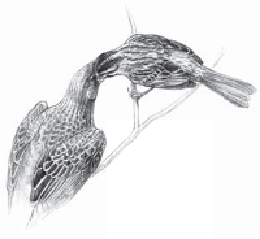Biology Reference
In-Depth Information
suspicious of any egg or chick that didn't look “right,” they might sometimes reject one
of their own eggs or young. When most parent songbirds hear the sounds of a begging
chick or see a chick's colorful mouth opened wide, they instinctively search for food and
try to feed it. In one experiment, European Pied Flycatchers continued to bring food to
their own young even after the chicks were satiated when researchers played a record-
ing of begging young. Wildlife rehabbers take advantage of this when they sometimes
“foster” a baby bird out by placing it in a wild nest of the same species with young of the
same age.
Althoughmanybirdbehaviors,suchastheurgetofeednestlings,areinstinctive,these
behaviors are refined by learning. The high cost of rearing a cowbird apparently leads
some experienced birds to start figuring out that adult cowbirds present a problem. Re-
searchershavefoundthatolderSongSparrowfemalesaremoreoftenheardmakingalarm
calls when they detect a cowbird skulking near their nest than younger, inexperienced fe-
males do. Ironically, older Song Sparrows are also more likely than young ones to end
up with a cowbird egg in their nest, probably because by making those alarm calls, they
signal the cowbird that they're nesting nearby.
Q If cowbirds are raised by other birds, why don't they imprint on those species?
A
Peoplearestillstudyingthisissue.Aftercowbirdsareindependent,theyjoinwithother
cowbirds and don't associate with their foster parents any longer. Recent research sug-
gests that female cowbirds may pay attention to their young. There are a handful of re-
cords of female cowbirds feeding cowbird nestlings or fledglings, including one record
of a banded female feeding a banded chick that was identified as hers. There isn't sol-
id evidence that cowbirds regularly maintain contact with their young, though I've ob-
served adult female cowbirds on the same branch as fledglings and there are many re-
ports of adult female cowbirds feeding fledglings that may have been their own. Wheth-
er it's learned or instinctive, cowbirds do apparently know that they're cowbirds and not
warblers, sparrows, or other species.



